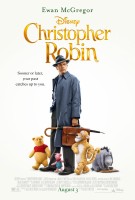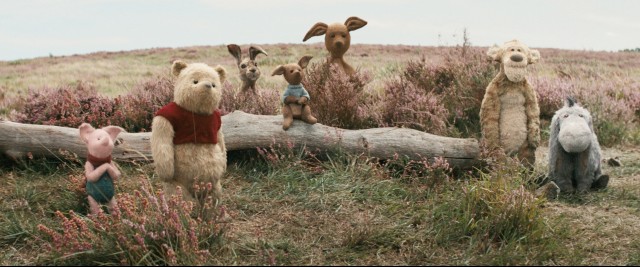Christopher Robin Movie Review
 |
Christopher Robin
Theatrical Release: August 3, 2018 / Running Time: 120 Minutes / Rating: PG Director: Marc Forster / Writers: Alex Ross Perry, Tom McCarthy, Allison Schroeder (screenplay); Greg Booker, Mark Steven Johnson (story); A.A. Milne, E.H. Shepard (characters) Cast: Ewan McGregor (Christopher Robin), Hayley Atwell (Evelyn Robin), Bronte Carmichael (Madeline Robin), Mark Gatiss (Giles Winslow), Oliver Ford Davies (Old Man Winslow), Ronke Adekoluejo (Katherine Dane), Adrian Scarborough (Hal Gallsworthy), Roger Ashton-Griffiths (Ralph Butterworth), Ken Nwosu (Paul Hastings), John Dagleish (Matthew Leadbetter), Amanda Lawrence (Joan MacMillan), Orton O'Brien (Young Christopher Robin), Katy Carmichael (Christopher's Mother), Tristan Sturrock (Christopher's Father) / Voice Cast: Jim Cummings (Winnie the Pooh, Tigger), Brad Garrett (Eeyore), Nick Mohammed (Piglet), Peter Capaldi (Rabbit), Sophie Okonedo (Kanga), Sara Sheen (Roo), Toby Jones (Owl) |
If you were to sum up Bob Iger's reign as CEO of the Walt Disney Company in just one word, that word would have to be "brands." With Iger in charge, Disney bought Pixar, Marvel, and Lucasfilm and is in the process of acquiring 20th Century Fox. That has dramatically changed the film output of the longtime leader in family entertainment. Disney doesn't really make movies anymore. They make tentpoles, whose nine-digit budgets demand worldwide earnings of ten digits to be deemed successful. In 1995, the company released 32 films theatrically through their Disney, Touchstone, and Hollywood Pictures labels. This year, when we exclude the Marvel, Pixar, and Lucasfilm efforts, we end up with just four live-action Disney productions, including last winter's A Wrinkle in Time and the upcoming The Nutcracker and the Four Realms and Mary Poppins Returns. The year's smallest in-house production, Christopher Robin, arrives in theaters today. This is a medium-sized Disney movie, something that has all but grown obsolete under Iger. It is tempting to declare it an original standalone film; after all, it is not a sequel and certainly will not inspire one. At the same time, as you surely know from the title, it is based on one of the most lucrative brands in Disney history.
A year after Fox Searchlight gave us the uneventful snooze of an A.A. Milne biopic titled Goodbye Christopher Robin, Disney takes a franchise it has long directed squarely at preschoolers and attempts to put an artistic, adult-friendly spin on it.
Rightly assuming that as an Earthling you are familiar with Milne's books, which Disney has been adapting in animation since the 1960s, Christopher Robin doesn't spend a whole lot of time introducing you to the Hundred Acre Wood, the idyllic forest where the titular British boy goes on adventures with the anthorpomorphic animals Winnie the Pooh, Tigger, Piglet, Eeyore, Rabbit, Owl, Kanga, and Roo. In this version, the animals are CGI creations resembling E.H. Shepard's original illustrations and the actual stuffed animals Milne's son played with as much as Disney's more familiar and widely marketed hand-drawn cartoon interpretations.
Credits and pages from Milne's books flow for several minutes until we are given a Christopher Robin who has grown up and set childish things aside, even his beloved imaginary forest friends. Robin (played henceforth by Ewan McGregor) has married a woman named Evelyn (Hayley Atwell), served in World War II, and fathered a daughter named Madeline (Bronte Carmichael). Shortly after the War, the grown-up Robin works as an efficiency manager for a luggage company. He works hard at the behest of his boob of a boss (Mark Gatiss), who demands Robin cancel his weekend family plans to focus on a major campaign.
A workaholic who has no time for his wife, kid, and having fun? You can easily see where this is going. In fact, while Evelyn and Madeline are at the family's peaceful country estate, Christopher gets a visit from his old pal Pooh (voiced, as he has been for the past thirty years, by Jim Cummings). Pooh has wandered out of a tree and into Christopher's London neighborhood. The friendship does not pick up where it left off. Pooh doesn't understand Christopher's adult life and Christopher is mildly annoyed by the bear of little brain's musings.
But you can bet that Pooh and, to a lesser degree, the other Hundred Acre Wood animals (particularly Piglet, Tigger, and Eeyore) are about to awaken the long-lost child within the hard-working businessman and to restore some of the joy that has been missing from his life.
Credited to three screenwriters (including Oscar-winning Up and Spotlight scribe Tom McCarthy and Hidden Figures' Allison Schroeder) and two story people without an ampersand of collaboration in sight, Christopher Robin seems to aim for the critical acclaim and winning dynamic of the recent Paddington movies. Only where those two timeless family comedies offer joy and wit, this movie relies most extensively on melancholy. In terms of cartoon characters' mirth, Pooh has always ranked somewhere around Charlie Brown, but here he seems to be on the verge of tears the whole time and so are you just looking at him. Sadness pervades the film and no final act cheer can make up for that. There's a little humor, most significantly when Pooh accompanies Christopher Robin on a train and plays the "say what you see game", which is almost reminiscent of the comedy in Elf. For involving a franchise that has been aimed primarily at the very young, this Disney film admirably avoids pandering to that demographic with broad comedy, even if that has historically been part of the canon. This one seems determined to be even less accessible to children than 2016's broody Pete's Dragon remake. That would be perfectly fine -- Saving Mr. Banks is second only to The Muppets in this decade's Disney-branded live-action cinema -- if the movie managed to keep adults stimulated and engaged, but it struggles on that front too, with not enough wit to support the gloomy atmosphere and two-hour runtime.
There are certainly some facets of the film to appreciate. Visually, this is a feast, with stately production design and cinematography putting it on the order of such artful family fare as Hugo and Wonderstruck. Musically, it is also up to snuff. The film serves up two classic Sherman Brothers Pooh songs, three counting the theme that permeates the score by Geoff Zanelli and Jon Brion. It also provides two new songs by Richard Sherman, one of which is performed on a beach in the end credits by the legendary Disney songwriter who turned 90 this summer.
You've also got to give Disney credit for taking a novel approach to this material. Seemingly at the desire of John Lasseter, the studio gave us a pure, faithful hand-drawn Winnie the Pooh movie in 2011, which was agreeable yet slight both creatively and commercially. Instead of refashioning the universe for another incarnation on Disney Junior or going the 2016 Jungle Book route of remaking it with "real" CGI animals, Disney got some accomplished writers and a respectable director (Finding Neverland's Marc Forster) to do something different and creative. Yes, it doesn't work as well as you'd like it to, but in a summer full of sequels and devoid of surprises, it is easy to appreciate this as at least a noble effort.
|
Related Reviews:
DVDizzy.com | DVD and Blu-ray Reviews | New and Upcoming DVD & Blu-ray Schedule | Upcoming Cover Art | Search This Site
DVDizzy.com Top Stories:
Now in Theaters: Teen Titans Go! To the Movies • The Darkest Minds • The Spy Who Dumped Me • Eighth Grade
Winnie the Pooh (2011) • The Many Adventures of Winnie the Pooh • The Tigger Movie
Saving Mr. Banks • Pete's Dragon (2016) • Hugo • Wonderstruck • Goodbye Christopher Robin • Mary Poppins A Wrinkle in Time
Directed by Marc Forster: Finding Neverland • World War Z
Written by Tom McCarthy: Spotlight • The Station Agent • Win Win • Up | Written by Allison Schroeder: Hidden Figures
Ewan McGregor: American Pastoral • The Men Who Stare at Goats • The Impossible
Hayley Atwell: Captain America: The Winter Soldier • Brideshead Revisited
Text copyright 2018 DVDizzy.com. Images copyright 2018 Disney and 2DUX2.
Unauthorized reproduction prohibited.

